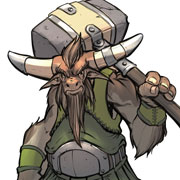|
Terrible Opinions posted:Except none of those things are bad. You have the weirdest posting gimmick but I can at least respect your dedication.
|
|
|
|

|
| # ? May 18, 2024 04:22 |
|
homullus posted:"D&D brain damage" is shorthand for "traditionally, a player doesn't get much use out of setting books" et cetera. D&D was about new classes, new spells, new skills/proficiencies, new monster statblocks, new magic items, new feats; its immediate siblings did the same. Their successors all did the same. So now we have much (most?) of the RPG market and people in this very thread saying that is the natural order of things, that of course new crunch is THE WAY players interact with the world, whatever else could there be for players to interact with, and furthermore why would you think that it is even possible that a book could succeed without that? Hell, not too long ago, for a whole lot of games and their supplements the amount of crunch was pretty much the ONLY selling point. Too many RPG cover blurbs posted:
|
|
|
|
gradenko_2000 posted:The impression I got, and something I hypothetically plan to do if I got the chance, is that these things would probably be more useful as something you gave to players upon reaching certain narrative goals and milestones, rather than something you expect them to deliberately aim for. You mean like magic items in 4e? 
|
|
|
|
I post from the highest level of irony, sincere enjoyment.
|
|
|
|
P.d0t posted:You mean like magic items in 4e? There was actually I believe a Dragon article that discussed giving people "quest rewards" that were things like "Lord Dunrick's Favor" or "Purple Dragon Combat Training" that were effectively refluffed magic items, that is to say that they functioned exactly as magic items did in 4E in the form of some passive bonuses along with an active Encounter or Daily ability of some sort to represent various boons that the characters had gained through their adventures.
|
|
|
|
P.d0t posted:You mean like magic items in 4e? Not really? I mean there are still "builds" for those, as far as the Slayer wanting that charge kit and most people wanting those boots that let you stand up as a minor, such that if you're operating on the normal magic item economy, they're going to want those and equip those even if you throw a Mandolin of Diplomacy at them as a narrative reward. And withholding those items that they like so that they'll be forced to use the ones that you dole out smacks of forcing a 3e player to go into that Purple Dragon Knight PrC when what they were originally aiming for was Dungeoncrasher.
|
|
|
|
gradenko_2000 posted:The impression I got, and something I hypothetically plan to do if I got the chance, is that these things would probably be more useful as something you gave to players upon reaching certain narrative goals and milestones, rather than something you expect them to deliberately aim for. I've just done pretty much exactly this in a 5E game I'm running. One player pledged allegiance to a Far Realm entity, so now he gets a special power, and will get a couple more as he levels up--assuming he sticks with the pact. I've done it as extra powers, outside the class structure. Its not exactly balanced, but 5E has poo poo balance anyway, and any other PC can get the same stuff (or different stuff if they do other cool story stuff).
|
|
|
|
Leperflesh posted:Or: a game has a set of components (maybe a deck of cards or some tokens) that are rarely used and in some cases a game might pass where those components are never used, so perhaps they're a waste of game budget. I think there's a type of player who this absolutely appeals to. Aces and Eights featured exhaustive minigames subsystems for Western movie tropes. Your campaign might never have a trial, shootout, or cattle drive, but there were dozens of props, worksheets, and appendices to audit the outcomes just in case it did. It's like the car chase in Savage Worlds, or 3x grappling. People love designing weird peninsulas of rules for extremely specific circumstances, sometimes going so far as to include unique handouts or props, which has gently caress-all to do with the game (which probably already includes mechanisms to resolve it!) but makes interesting bathroom reading.
|
|
|
|
JackMann posted:Pretty much, the issue is that so far as I'm aware, there aren't many games where players interact with the setting outside of the crunch where a setting guide would be useful. The only games I know of where players have other tools to directly interface with the setting, they're actively creating the setting whole-cloth. Fellowship, for example, where if you play a dwarf, you decide what all dwarves are like. A setting book wouldn't really be useful there. In more crunchy systems, setting information can be nice, but it's still not the part of the game the player is directly in charge of, and they have to hope the GM is going to help them work it into the game. Fellowship actually has supplements, too. Each of the bonus playbooks comes with an expansion that adds themed mechanical options for both the Overlord and other playbooks. I think it's all very nice but clearly it's my brain damage talking.
|
|
|
|
homullus posted:"D&D brain damage" is shorthand for "traditionally, a player doesn't get much use out of setting books" et cetera. D&D was about new classes, new spells, new skills/proficiencies, new monster statblocks, new magic items, new feats; its immediate siblings did the same. Their successors all did the same. So now we have much (most?) of the RPG market and people in this very thread saying that is the natural order of things, that of course new crunch is THE WAY players interact with the world, whatever else could there be for players to interact with, and furthermore why would you think that it is even possible that a book could succeed without that? Maybe you should reword that because of the inherent ableism in the term? Please?
|
|
|
|
JackMann posted:Pretty much, the issue is that so far as I'm aware, there aren't many games where players interact with the setting outside of the crunch where a setting guide would be useful. The only games I know of where players have other tools to directly interface with the setting, they're actively creating the setting whole-cloth. Fellowship, for example, where if you play a dwarf, you decide what all dwarves are like. A setting book wouldn't really be useful there. In more crunchy systems, setting information can be nice, but it's still not the part of the game the player is directly in charge of, and they have to hope the GM is going to help them work it into the game. So what you want is kind of Lore Sheets from Eos games (Legends of the Wulin/Weapons of the Gods), bits of setting that you can spend points on that give an immediate benefit for your character and also emphasize part of the setting to the GM as something you want to explore.
|
|
|
|
Nuns with Guns posted:It's not brain damage for players to expect some new mechanics in an RPG supplement when the vast majority of supplements for every RPG in existence offer some extra mechanical tools. Dismissing consumer expectations on D&D post-traumatic stress disorder is idiotic. My inference from your post is that I did not make my point clearly. As a writing exercise, here is my point, made entirely with words that are one syllable: For all time, these games have had lots of rules and crunch. Now, all (or close to all) those who buy these games want rules and crunch in each book. The cause: this is the way it has been for a long time. Not the cause: this is the way things must be when a game wants to say more on its world, in a way that could please those who play it. To talk of these books as if they must be this way is not good, because this is not true. I think it would be hard to change what those who play these games want now, but I think we must keep in mind what could be, as this is the way that games change. Plutonis posted:Maybe you should reword that because of the inherent ableism in the term? Please? I will say too that I should not have said those things. I will not change the old post (no point, it is in quotes now), but will not say those things more.
|
|
|
|
Terrible Opinions posted:Except none of those things are bad. They are all either terrible on their face or implemented with a thoughtless lack of restraint that makes the benefit they bring wildly disproportionate in comparison to the effort they consume and the annoyance they cause.
|
|
|
|
The Book of Changing Years for Timewatch is probably the only crunch-less RPG supplement I've ever purchased that I haven't felt like was a waste of time, and honestly it's mostly because it half of it was explicitly a collection of tie-in short stories instead of being a collection of pirate story or fantasy fiction cliches I could have come up with on my own.
|
|
|
|
8one6 posted:The Book of Changing Years for Timewatch is probably the only crunch-less RPG supplement I've ever purchased that I haven't felt like was a waste of time, and honestly it's mostly because it half of it was explicitly a collection of tie-in short stories instead of being a collection of pirate story or fantasy fiction cliches I could have come up with on my own. One example I have imagined of how crunchless supplements could work is a game that is kind of "D&D novice clerics & paladins." Out of the box, the setting gives each religion its central tenets and commandments; their actions must conform to these, and these are their agenda in the game. There might be some game benefits for adherence to their religion. A crunchless supplement would be a "holy book" (IRL probably just a saddle-stitched chapbook) for each faction, with additional parables and intentionally vague "laws" for them to cite and quote as they debate everything from judgment for wrongdoers to how to advise the queen.
|
|
|
|
 ...hmm.
|
|
|
|
I'm deeply offended. By the use of a lossy-compression image format for an image containing only text, for gently caress's sake people .png has been around for decades now. ...and that's a .png! So it has to be a .png converted from a .jpg which is even more aargh
|
|
|
|
Sorry; I just screencapped someone else's much larger screenshot.
|
|
|
|
Evil Mastermind posted:
I think what gets me is the inconsistency - if the second paragraph wasn't there it'd be a lot less weird. Like, do they want to deal with/joke about discrimination on grounds of gender, sex and sexuality or not?
|
|
|
|
What gets me about this is that up until this edition, sexuality has been handled with "everyone is on a fuckton of hormone suppressants; gender is more or less meaningless because <see above>" and calling it a day. Paranoia is not a game that needs to deal with sexuality.
|
|
|
|
Ban all heteros 2k17
|
|
|
|
Evil Mastermind posted:What gets me about this is that up until this edition, sexuality has been handled with "everyone is on a fuckton of hormone suppressants; gender is more or less meaningless because <see above>" and calling it a day. Yeah, from what I'd heard this edition goes far away from being able to play a serious, dystopic game in Alpha Complex. Maybe they thought that making straight people the oppressed group makes it comedic instead of oppressive?  (Also with they explanation they give it should be *procreative* sex that's banned, not heterosexual sex. Conflating the two is its own can of worms, and again has little place in Paranoia)
|
|
|
|
as a straight person i find that paragraph hilarious, and since traitors are everywhere the implication is still obviously "don't do sex stuff in paranoia you dweebs"
|
|
|
|
I'm going to have non-penetrative homosexual sex and The Computer cannot stop me.
|
|
|
|
homullus posted:For all time, these games have had lots of rules and crunch. Now, all (or close to all) those who buy these games want rules and crunch in each book. The cause: this is the way it has been for a long time. Not the cause: this is the way things must be when a game wants to say more on its world, in a way that could please those who play it. To talk of these books as if they must be this way is not good, because this is not true. I think it would be hard to change what those who play these games want now, but I think we must keep in mind what could be, as this is the way that games change. The reason you're an idiot is that you're conflating at least two - and probably three - different arguments, and in doing so, you end up being the one arguing for the cargo cult design you claim to be against. The argument about whether to include mechanics in supplements is really about whether to include player-facing material in source books. And it's a pretty stupid argument to make that you shouldn't. Players always outnumber GMs - either there's one GM for several players, or everyone is in the player category anyways. Both to encourage sales and to actually provide material for your audience to use, it's pretty obvious nearly every product should have at least some player facing material. The second is whether the need to include player facing material is so critical that it justifies throwing in badly designed material. Obviously this isn't the case, and less good material will trump more bad material for the vast majority of consumers. The third argument is about what player facing material is. It definitely is an artifact of D&D's design and cargo cult approach that so many games have a stark divide between mechanics and narrative material, and that player facing material is essentially always mechanics. No one is arguing that this divide is the only way to design a game. But when your example is a game where that divide already exists, your entire framework becomes, frankly, specious. Everyone else is making the point that including player facing material is a good idea and not doing so is generally a bad one. No one is arguing that this is so necessary that it justifies including lovely player facing material. And the focus on mechanics as player facing material isn't because no one else can conceive of other kinds of player facing material - its because you keep going back to a game that explicitly does it that way as your example. You've set up a situation where no one can discuss the idea in good faith because if they address one of the arguments you're falsely conflating, you spring the one of the other ones on them. So I'll address all of it at once: 1. It's both good design and good business to include player facing material in the majority of your releases 2. There's no particular reason player facing material HAS to be mechanics when you design a game 3. However, if your game does make that distinction, it behooves you to return to 1 and include some mechanics in most of your releases 4. If you can't come up with good player facing material, whether its mechanics or not, don't throw it in for it's own sake - but you should probably keep working on it until you have good player facing material
|
|
|
|
How does one define mechanical crunch? Because I can think of plenty of supplements over the years that would qualify as crunchless, depending on the definition. Some of my favourite D&D supplements of old didn't have any new rules, player options, or spells, they were just setting building sourcebooks.
|
|
|
|
Falstaff posted:How does one define mechanical crunch? Because I can think of plenty of supplements over the years that would qualify as crunchless, depending on the definition. Some of my favourite D&D supplements of old didn't have any new rules, player options, or spells, they were just setting building sourcebooks. Setting Building Sourcebooks are good if they present material that the player can use in some meaningful way. Here's how people from <COUNTRY> act, this is the <NOBLE ORDER OF COUNTRY PALADINS> and what they do with their free time. But things like the 4e draconomicons were mostly stuff that the players couldn't interact with in any meaningful way unless exposed to it via the DM as a lens, and were only marginally useful for DMs as well. The thing is, though, if your book is describing things that your player can interact with, particularly specific organizations, usually comes with mechanics. The Eberron books (Except for The book that was nothing but a historical treatise on the last war) are famous for this. "Here's the Blood of Vol cult, here's the actual church that they show to the lower ranking members, here's how they behave, here's the prestige class that the inner circle uses to live forever by literally stealing years of life from others."
|
|
|
|
"Crunch" is usually taken to mean game rules. It could be as simple as "If your character is an Adherent of Mephisto, he may not be Good-aligned." That's a rule. A book about Adherents of Mephisto that describes how evil they are, the terrible aims of the organization, and a list of their dark deeds, but which does not engage with the rules by making rules statements, could still be useful to a player who wants to know what his Adherent of Mephisto believes, how he fits into that organization, and so on. There may be a market expectation that Adherents of Mephisto get a prestige class or some special spells or whatever, but I was trying to mostly discuss possibilities, rather than market expectations. One difficulty with writing a (crunch-free or not) setting sourcebook intended for both players and GMs, is the issue of secrecy. If the sourcebook tells you that the head of the Adherents of Mephisto is secretly a vampire, but that's not general knowledge, then players reading the book find that out and it takes away the ability of the GM to have an adventure in which that fact and its secrecy are central to the plot. The efficacy of a sourcebook as a source of ideas for running adventures, a set of interesting NPCs to engage with, and some mysterious places to explore is directly undermined by the degree to which players access that material. But perhaps that'd be OK if you did the same split as the split between GM and player content established by D&D? If you can have a PHB, a DMG, and published adventures, perhaps you'd publish a Player's Guide to a setting, and a companion GM's Guide to that setting. I'm sure that's been done, actually, although I can't think of an example off the top of my head.
|
|
|
|
The best crunchless supplement is clearly the Spherewalker Sourcebook for Everway, by goon favourite and all round excellent writer Greg Stolze.
|
|
|
|
Prestige classes and feats suffer the same problem, which is why they get intermingled so much: nobody ever actually bothered defining what they were and what they were meant to be. Are prestige classes a fluff based reward? Are they expansions to your original class? Are they a means of multiclassing? Are they fixes to weak elements in the game? Are they a mix of trap options and overly strong options to reward charop? Are they meant to help broaden your character or super focus them into a niche? You could ask MOST of these questions of feats, too. The answer to all of those is "maybe!" because nobody who actually thinks about games as mechanics stays in this hobby, and that goes double for the edition where "refluff your spells!" was turned into a goddamn feat you had to take.
|
|
|
|
feats and prestige classes are an attempt to rectify the fundamental limitation of a class-based RPG system, but without actually abandoning classes and permitting players to just pick and choose character abilities like a points-buy system.
|
|
|
|
ProfessorCirno posted:Prestige classes and feats suffer the same problem, which is why they get intermingled so much: nobody ever actually bothered defining what they were and what they were meant to be.
|
|
|
|
Comrade Gorbash posted:Your being an rear end in a top hat would be a lot more tolerable if you weren't also an idiot, just so you know. quote:So I'll address all of it at once: quote:No one is arguing that this divide is the only way to design a game. I inferred that argument from this post. It still reads like "you must player-facing crunch in your supplements, because that is how the setting comes alive" to me. Sampatrick posted:Variations on character options are what make a setting come alive. If you're not adding those new options, you're just writing a weird almanac.
|
|
|
|
I can think of several example of novel-mechanics-free RPG books. Most of them are Gloranthan – The Guide to Glorantha is the obvious example, but many of the Heroquest books are all but crunch-free and Griffin Mountain has but one paltry cult writeup that's not really the point of the book. The other example, on the other hand, is the Dracula Dossier, which is 100% content. I imagine that a fair amount of Cthulhu [Insert System Here] supplements are pretty mechanics-free too, although I don't know enough about that genre to say for sure.
|
|
|
|
Well, the other problem with feats was that there was no definition of what a "feat" was in terms of mechanical power. Like, Fate's stunts have a list that says "this is what one stunt can do: X, Y, Z" so 90% of the time each stunt has about equal mechanical strength. But with D&D, they were all over the place. Maybe a stunt was a non-scaling +2 bonus to two skills, maybe it was an ability that lets you cast spells faster, maybe it was an ability that let you do a fighter trick without provoking! Who knows! They're whatever you want!
|
|
|
|
Also like half the fighter feats are "if you have this feat, you don't take the huge default penalty to do X." You're not paying points to be good, you're paying points to not be completely hosed over when you try to do anything interesting. Meanwhile, spells just do stuff.Evil Mastermind posted:No, I hold them down and press a copy of Apocalypse World on their forehead while yelling "THE POWER OF VINCENT COMPELS YOU!" Kwyndig posted:Several companies, when talking about the economics of sourcebook sales, have stated this. Personally I don't have an issue with it as long as the new content isn't bad, because you have to do something to get people to buy your books. It's when the new rules material is terrible that I start getting mad at companies for doing it (I'm looking at you TSR). dwarf74 posted:Mechanics-free source books just scream "90's excess" to me. Halloween Jack fucked around with this message at 22:07 on Apr 19, 2017 |
|
|
|
edit:dp
Halloween Jack fucked around with this message at 22:07 on Apr 19, 2017 |
|
|
|
Leperflesh posted:feats and prestige classes are an attempt to rectify the fundamental limitation of a class-based RPG system, but without actually abandoning classes and permitting players to just pick and choose character abilities like a points-buy system. You pretty much hit the elephant-in-the-room size nail on the head. Whatever feats and prestige classes were originally intended as, they very quickly became a way for people who would strip a gear if someone published a classless, point-buy D&D to still effectively get a pseudo point-buy D&D. That's why the charop minigame suddenly became super important in 3.X whereas in previous editions there were still ways to minmax but it wasn't a matter of "I'm gonna plan my character's progression out for 20 levels taking these crucial feats and dipping into six classes."
|
|
|
|
that's only because the older editions' splat material didn't mesh together coherently, if at all.
|
|
|
|

|
| # ? May 18, 2024 04:22 |
|
Cease to Hope posted:that's only because the older editions' splat material didn't mesh together coherently, if at all. I feel like there was also a shift in attitude regarding player-facing crunch as well. Back in the day a player rolling up to the table with the Complete Book of Whatever and saying he wanted to use this or that kit was more often than not viewed with suspicion, but when 3E baked feats and prestige classes into the core game it seemed to normalize it to the point that combing sourcebooks for more of them was just business as usual. This might have also been because it was piss-easy to snap 3E over your knee simply by playing a single-class Druid or Wizard right out of the corebook to level 20.
|
|
|


































